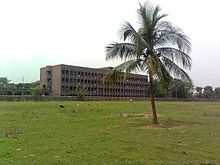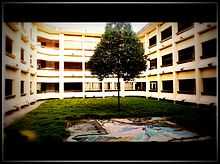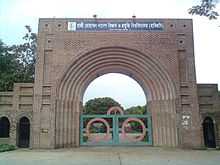Hajee Mohammad Danesh Science & Technology University
| Hajee Mohammad Danesh Science and Technology University (HSTU) | |
|---|---|
| হাজী মোহাম্মদ দানেশ বিজ্ঞান ও প্রযুক্তি বিশ্ববিদ্যালয় | |
 | |
| Established | 1979 (University Started 11 September 1999) |
| Type | Public, coeducational |
| Chancellor | Abdul Hamid, Honorable President |
| Vice-Chancellor | Professor Md. Ruhul Amin |
| Dean | 7 |
Academic staff | 491 |
| Students | 5500 |
| Undergraduates | 5000 |
| Postgraduates | 450 |
| 50 | |
| Location |
Dinajpur, |
| Campus | Rural 130 acres |
| Nickname | HSTU |
| Affiliations | University Grants Commission |
| Website | http://www.hstu.ac.bd |
Hajee Mohammad Danesh Science and Technology University is a government-financed public university of Bangladesh. It's shortly called HSTU and Locally known as Hajee Danesh University. It's situated between 10(Dosh)mile & Dinajpur city which place known as Basherhat. Besides HSTU a sports school named BKSP(Dinajpur) which also established by government of Bangladesh.
In 2015 more than 100 foreign students come from five country.
History
In 1979 Hajee Mohammad Danesh Science and Technology University was established as an Agricultural Extension Training Institute (AETI) to award a three-year diploma in agriculture. The AETI was later upgraded to Hajee Mohammad Danesh Agricultural College in 1988 having an affiliation from the Bangladesh Agricultural University, Mymensingh. Then the college was upgraded to the status of a university renaming it as Hajee Mohammad Danesh Science and Technology University on 11 September 1999.
Hajee Mohammad Danesh
Hajee Mohammad Danesh (1900-1986) was a peasant leader and politician. He was born in Sultanpur village in Dinajpur district. Having obtained his M.A. in History from Aligarh Muslim University in 1931 and B.L. degree in 1932. In the 1930s, Danesh became active in the communist organisations of Bengal, especially the Bengal provincial organisation of the Communist Party of India.[1] He was arrested twice in 1938 by the government of Bengal for his participation in the Tebhaga movement, an agitation in northern Bengal against zamindars landlords for landless peasants and share-croppers who sought a greater share of the yield, most of which was surrendered to the zamindars.[1][2] Danesh was one of the few Muslim communist leaders of the struggle, and worked to mobilise the Muslim peasantry in favor of the movement.[3] In 1945, he joined the All India Muslim League, but was later expelled for his participation in the continuing Tebagha movement, and re-arrested by the Bengal government in 1946.After the partition of India and Bengal in 1947, Danesh remained in his home district of Dinajpur, which fell in Muslim-majority East Bengal, which became part of the newly created Muslim state of Pakistan. He died in Dhaka on 28 June 1986.
Academics
The university offers 18 under-graduate degrees under seven faculties along with several post-graduate and doctoral courses. These are
1. Faculty of Postgraduate Studies
- Ph D
- MS
- MBA
- Evening MBA
2. Faculty of Engineering
- B.Sc. in Food and Process Engineering (FPE)
- B.Sc. in Agricultural Engineering (AE)
- Bachelor of Architecture
- B.Sc. in Civil Engineering
3. Faculty of Computer Science and Engineering
- B.Sc. in Computer Science and Engineering (CSE)
- B.Sc. in Telecommunication and Electronic Engineering (TEE)
- B.Sc. in Electrical and Electronic Engineering (EEE)
- B.A (Hons.) in English
4.Faculty of Business Studies
- Bachelor of Business Administration (BBA)
- Bachelor of Business Administration (major in level-4)
- BBA (major in accounting)
- BBA (major in marketing)
- BBA (major in management)
- BBA (major in finance & banking)
- B.A (Hons.) in Economics
5.Faculty of Agriculture
- B.Sc.(Hons.) in Agriculture
- B.Sc.(Hons.) in Agriculture and Argi-Business (AAB)
6.Faculty of Fisheres
- B.Sc.(Hons.) in Fisheries
7.Faculty of Veterinary and Animal Science
- Doctor of Veterinary Medicine (DVM)
8.Faculty of Science
- B.Sc.(Hons.) in Physics
- B.Sc.(Hons.) in Chemistry
- B.Sc.(Hons.) in Mathematics
- B.Sc.(Hons.) in Statistics







Faculties
There are seven faculties in HSTU with 43 departments:
Faculty of Engineering:
- Department of Agricultural & Industrial Engineering (AIE)
- Department of Food Engineering & Technology (FET)
- Department of Food Processing & Preservation (FPP)
- Department of Food Science & Nutrition (FSN)
- Department of Architecture
- Department of Civil
Faculty of Computer Science and Engineering:
- Department of Telecommunication and Electronic Engineering(TEE)
- Department of Computer Engineering & Networking(CEN)
- Department of Electrical & Electronic Engineering
- Department of Computer & Information Technology(CIT)
- Department of Social Science & Language(SSL)
- Department of English
Faculty of Business Studies:
- Department of Accounting & Information System(ACT)
- Department of Economics(ECN)
- Department of Management Studies(MGT)
- Department of Marketing(MKT)
- Department of Finance and Banking(FIB)
Faculty of Agriculture:
- Department of Agronomy(AGN)
- Department of Agro-forestry(AGF)
- Department of Animal Husbandry
- Department of Agricultural Extension(AEX)
- Department of Agricultural Chemistry and Bio-chemistry(ACH)
- Department of Crop Botany
- Department of Entomology
- Department of Genetics & Plant Breeding
- Department of Horticulture
- Department of Plant Pathology
- Department of Soil Science
Faculty of Fisheries:
- Department of Fisheries Biology & Genetics(FBG)
- Department of Fisheries Management(FMG)
- Department of Fisheries Technology(FTL)
- Department of Aquaculture(AQC)
Faculty of Veterinary & Animal Science:
- Department of Anatomy and Histology(ANH)
- Department of Medicine, Surgery and Obstetrics(MSO)
- Department of Microbiology(MIC)
- Department of Pathology and Parasitology(PPS)
- Department of Physiology, Pharmacology and Therapeutics(PPH)
- Department of General Animal Science and Nutrition(ASN)
- Department of genetics and Animal breeding(GAB)
- Department of Dairy and Poultry Science(DPS)
Faculty of Science
- Department of Chemistry (CHE)
- Department of Statistics(STT)
- Department of Mathematics(MAT)
- Department of Physics(PHY)
Faculty Of Post Graduate Studies
Institute
Science For advanced RESEARCH the Institute of Research and Training (IRT) has been established.
Student life
Halls of residence
Students admitted to the faculties reside in or are attached to a hall of residence. The university has five halls of residence: three for male students and two for females. Halls are headed by a provost (called Hall Super) who is assisted by house tutors and assistant house tutors. The administration of a dormitory is controlled by a Hall President and his/her assistants.
- Male halls
1. Dormitory -1 (Shekh Rasel Hall), 2. Dormitory -2 (Shaheed Rastrapati Ziaur Rahman Hall), 3. Dormitory -4 (Tajuddin Ahmed Hall) &
- Female halls
1. Dormitory -3(Shekh Fajilatunnesa Mujib Hall), & 2. Ladies Hall Extension -1(Ivy Rahman Hall), 3. Ladies Hall Extension -2(Pritilota Hall)
★An extended area for foreign students.
Student organizations
Students at HSTU are involved in extra-curricular activities. The student organizations are:
- ESA (Engineering Student's Association)
- Debating Society of HSTU
- Programmers Arena
- HSTU-OSN(OPEN SOURCE NETWORK)
- এসো গণিত শিখি(CSE Faculty)
- ABS (Assosiation of Business Studies)
- SAFF (Student's Association Of Fisheries)
- BSWF (Business Studies Welfare Fund)
- CSEA(Computer Science and Engineering Association)
- Orko Shangskritik Jote
- Senjuty Sangskritik Oikko (Senjuty on Facebook)
- Rotaract club of HSTU (www.rotaracthstu.org)
- HSTU Film Club
- ElOmElO-11 Production (Musical & Film Making Group)
- Prothom-alo Bondhusobha
- Turbo Crater (A Music Band & Music School)
- HSTU Contest Programmer
- Programming Resource (Programming Resource in Facebook)
- Networking Clab, HSTU
Sports and extracurricular activities
The university organizes sports and other extracurricular and recreational activities. It provides intramural and extramural programmes.
Internal and external programmes (games and sports)
The directorate organizes and conducts interdepartmental and inter-hall tournaments, individual hall athletics, university athletics, and inter-university games and sports. Students participate in national championships in games and sports for which training and coaching are offered.
Library
The university Library contains a collection of more than 25,000 volumes, including bound volumes of periodicals. It subscribes to over 50 foreign journals. A complete automation of the system is in the process. The Confined Section of the library contains rare books.
Medical centre
The medical centre offers free medical service to students, teachers, staff and family members of the teachers and staff. The centre provides service round-the-clock, seven-days-a-week, with four doctors with ambulance facility. The centre has 12 bed accommodation so that patients suffering from contagious diseases may be cared for in isolation.
See also
- Patuakhali Science and Technology University (PSTU)
- Mawlana Bhashani Science and Technology University (MBSTU)
- Shahjalal University of Science and Technology (SUST)
- University of Dhaka (DU)
- Bangladesh University of Textiles (BUTex)
References
External links
- University Grant Commission
- Hajee mohammad Danesh Science And Technology University
- Faculty Of Fisheries Of HSTU
- Bangladesh Fisheries Information Share Home(BdFISH)
- A2Z Bangladesh Education Information
- Faculty Of Engineering